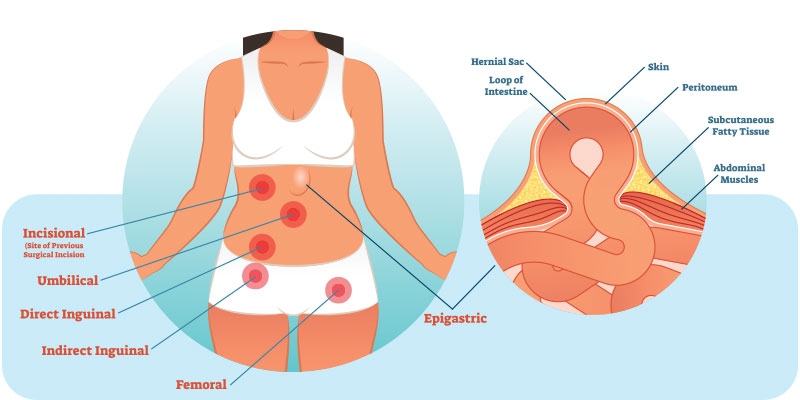Hernia, Everything That You Need to Know
2022-11-16 / RG STONE HOSPITAL / Hernia Repair

Hernia is a medical ailment that affects people who have weak muscles or underdeveloped tissues. When an organ or the intestines are under strain, it starts. As our bodies age, the muscles become even weaker, and the pressure that is exerted in the same area causes tissues and muscles to become loose, leading to the development of a hernia.
The majority of Indians have heard the word "hernia," but they don't fully comprehend the scope and severity of this condition. As a result, hernia as a sickness has received widespread misinformation throughout the nation.
When our abdominal organs protrude through a hole in the internal organ walls, it is referred to as a hernia, which is described medically as "the protrusion of the omentum or intestine via a defect."
The type of hernia depends on the location where it is present.
Hiatal hernia:
It occurs in the upper part of the abdomen. The upper part of the stomach is dragged into the chest. A hernia may be caused by scarring if you have had abdominal surgery in the past.
Umbilical hernia:
It is a bulge around the navel. It occurs when the muscles around the navel are not fully closed after childbirth.
Inguinal Hernia:
It is the most common type of hernia. It occurs when the intestine comes out through the weak abdominal wall.
Although there are a lot of things that can cause a hernia, the primary causes include the following:
-
Smoking
-
Obesity
-
Chronic cough
-
Lifting heavy objects
-
Bowel straining
-
Stressful exercise & activities that increase abdominal pressure
-
Hernias may be present at birth, but the bulge may not be apparent.
-
Family history
Acid reflux is one of the main symptoms that hernia patients experience. After consuming specific foods, this syndrome may result in pain and discomfort. Foods that produce less acid can be chosen to aid with this symptom. Here is some information on things to eat and stay away from.
Foods and drinks to avoid:
These foods include:
-
Onions and garlic
-
Certain citrus fruits, such as limes and oranges,
-
Tomatoes and tomato-based foods such as salsa and spaghetti sauces
-
Spicy foods
-
Fried foods
-
Sodium-rich foods
-
Cocoa and chocolate
-
Peppermint and spearmint
Beverages to Avoid:
-
Wine, beer, spirits, and other alcohol
-
Coffee
-
Caffeinated Tea
-
Carbonated Drinks
-
Milk
Food and Drinks to Eat:
There are still many good foods that don't produce much stomach acid. For example, many whole foods are unprocessed, so they are a good option.
Try:
-
Non-citrus fruit grains such as apples, pears, melons, and berries
-
Nuts and seeds, for example, almonds and chia seeds
-
Lean protein
-
Yogurt
-
Plant-based types of milk like soy milk and almond milk
-
Certain juices, such as aloe vera, carrot, and beetroot juices,
Besides diet, there are many things you can do to prevent and treat acid reflux due to a hiatal hernia.
Some lifestyle changes:
-
Do not lie down after eating.
-
Wait at least 2-3 hours after dinner before bed.
-
Raise the head of the bed by about 15 cm for comfortable sleep.
-
If you are overweight, work with your doctor to achieve a healthy weight.
-
Quit smoking
-
Avoid tight clothing. It can make heartburn worse.
-
Ask your doctor about over-the-counter (OTC) or prescription medications that may reduce stomach acid. Some OTC pills may include probiotics and digestive enzymes that are not very good for hernia patients.
-
Eat in a quiet, intimate setting.
-
Avoid getting up during meals.
If you're a Hernia patient and need expert advice and world-class treatment, visit your nearest branch of RG Hospital and consult our doctors for the best treatment.
The top surgical facility in Delhi for hernia surgery is RG Hospitals.
Years of experience treating Hernia have been accumulated by our Delhi hernia specialist.
Furthermore, RG Hospitals has a presence across all of India, including a Hernia expert in Mumbai and the leading hospital for Hernia surgery in Kolkata.
Categories
Hernia Repair
Appendicitis
Piles
Urological Treatment
Hernia treatment
Enlarged Prostate (BPH)
Gall Bladder Stone
Urinary / Kidney Stone
Vitamins
Indian Health Care System
Exercise
Obesity
Female Urinary Incontinence
Single Incision Laparoscopic Surgery (SILS)
Kidney Cancer
Bladder Cancer
Ovarian cancer
Nephrology
Bariatric Surgery
Kidney Function Test
Female Urology
Radiation Therapy
Alcoholic Fatty Liver
Liver disease
Gastroenterology
Kidney Disease

